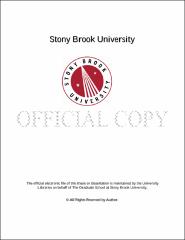| dc.identifier.uri | http://hdl.handle.net/11401/76861 | |
| dc.description.sponsorship | This work is sponsored by the Stony Brook University Graduate School in compliance with the requirements for completion of degree. | en_US |
| dc.format | Monograph | |
| dc.format.medium | Electronic Resource | en_US |
| dc.language.iso | en_US | |
| dc.publisher | The Graduate School, Stony Brook University: Stony Brook, NY. | |
| dc.type | Dissertation | |
| dcterms.abstract | There has been growing interest in establishing food waste prevention and recovery programs throughout the United States. An interdisciplinary systems approach to sustainable food waste management was taken to explore three integrated food waste issues: 1. the quantity of residential, commercial and institutional food waste disposed in the U.S.; 2. the environmental impact of food waste treatment technologies; and, 3. approaches for sustainable waste system planning and the development of food waste management policies. The dissertation begins with a review of the history, contributing factors, impacts, and current practices regarding food waste in the U.S. and globally. The amount of food waste disposed in the U.S. is not well determined, although this information is valuable for policy making and waste management planning. A systematic review and meta-analysis of waste characterization studies was conducted to quantify disposed food waste in a transparent, repeatable, systematic way, and to determine if specific factors drive increased disposal. This approach has benefits over the less transparent modeling used to date to estimate food waste. Sixty-two waste characterization studies were analyzed, representing over 20,000 samples of sorted waste, weighing more than four million pounds. Food waste was found to make up a considerable proportion of the disposed waste stream. The aggregate mean proportion of food waste in U.S. municipal solid waste from 1995 to 2013 was 0.147, which is lower than that estimated by USEPA for the same period (0.179). The proportion of food waste increased significantly with time, and U.S. region significantly affected the proportion of food waste disposed. There were no significant differences in food waste proportions between rural and urban samples, or between commercial/institutional and residential samples. The aggregate mean disposal rate for food waste from 1995 to 2013 was 0.615 pounds of food waste disposed per person per day. A life cycle assessment was conducted to evaluate the environmental impacts of food waste management technologies for a New York suburban municipality. Four food waste treatment scenarios were modeled, including waste to energy incineration, two types of composting, and anaerobic digestion, to quantify impacts on climate change, eutrophication, acidification, resource depletion, and stratospheric ozone depletion. Results indicated that choices in waste treatment technologies offer opportunities to reduce environmental impacts and produce beneficial end products, particularly through energy and materials recovery. Food waste treatment with anaerobic digestion offered the most impact reductions relative to the other modeled technologies, followed by waste to energy incineration and tunnel composting, and last, enclosed windrow composting. However, other aspects must also be considered when transitioning to more sustainable waste management systems, including economic costs, social priorities, and stakeholder concerns. To address this complexity, a decision and evaluation framework for waste management systems was developed. Emphasis was placed on using the framework to guide system planning to target food waste, particularly food waste prevention. The benefits of food waste prevention policies and the challenges with adopting such programs were examined. | |
| dcterms.available | 2017-09-20T16:51:20Z | |
| dcterms.contributor | Tonjes, David J. | en_US |
| dcterms.contributor | Ferguson, David | en_US |
| dcterms.contributor | Gurevitch, Jessica | en_US |
| dcterms.contributor | Walker, Harold | en_US |
| dcterms.contributor | Damgaard, Anders. | en_US |
| dcterms.creator | Thyberg, Krista Lee | |
| dcterms.dateAccepted | 2017-09-20T16:51:20Z | |
| dcterms.dateSubmitted | 2017-09-20T16:51:20Z | |
| dcterms.description | Department of Technology, Policy, and Innovation. | en_US |
| dcterms.extent | 202 pg. | en_US |
| dcterms.format | Application/PDF | en_US |
| dcterms.format | Monograph | |
| dcterms.identifier | http://hdl.handle.net/11401/76861 | |
| dcterms.issued | 2015-12-01 | |
| dcterms.language | en_US | |
| dcterms.provenance | Made available in DSpace on 2017-09-20T16:51:20Z (GMT). No. of bitstreams: 1
Thyberg_grad.sunysb_0771E_12314.pdf: 2713702 bytes, checksum: 9a42f1c97e2827469eefb0b02c395f90 (MD5)
Previous issue date: 1 | en |
| dcterms.publisher | The Graduate School, Stony Brook University: Stony Brook, NY. | |
| dcterms.subject | food waste, life cycle assessment, meta-analysis, organic waste, waste characterization, waste management | |
| dcterms.subject | Environmental management | |
| dcterms.title | Food Waste and Sustainability: Quantifying Food Waste Disposal and Evaluating the Environmental Impacts of Technologies and Policies | |
| dcterms.type | Dissertation | |

